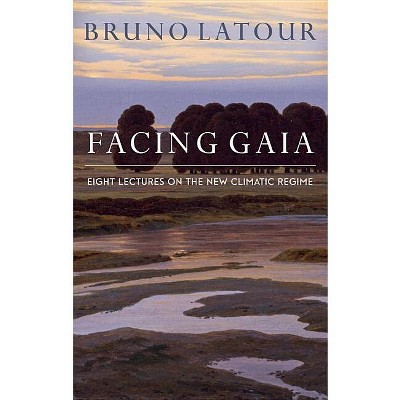Sponsored

The Making of Law - by Bruno LaTour (Paperback)
In Stock
Sponsored
About this item
Highlights
- In this book, Bruno Latour pursues his ethnographic inquiries into the different value systems of modern societies.
- About the Author: Bruno Latour is Professor of Sociology at Ecoles des mines, Paris.
- 280 Pages
- Social Science, Sociology
Description
About the Book
In this book, Bruno Latour pursues his ethnographic inquiries into the different value systems of modern societies. After science, technology, religion, art, it is now law that is being studied by using the same comparative ethnographic methods.Book Synopsis
In this book, Bruno Latour pursues his ethnographic inquiries into the different value systems of modern societies. After science, technology, religion, art, it is now law that is being studied by using the same comparative ethnographic methods. The case study is the daily practice of the French supreme courts, the Conseil d'Etat, specialized in administrative law (the equivalent of the Law Lords in Great Britain). Even though the French legal system is vastly different from the Anglo-American tradition and was created by Napoleon Bonaparte at the same time as the Code-based system, this branch of French law is the result of a home-grown tradition constructed on precedents. Thus, even though highly technical, the cases that form the matter of this book, are not so exotic for an English-speaking audience.What makes this study an important contribution to the social studies of law is that, because of an unprecedented access to the collective discussions of judges, Latour has been able to reconstruct in detail the weaving of legal reasoning: it is clearly not the social that explains the law, but the legal ties that alter what it is to be associated together. It is thus a major contribution to Latour's social theory since it is now possible to compare the ways legal ties build up associations with the other types of connection that he has studied in other fields of activity. His project of an alternative interpretation of the very notion of society has never been made clearer than in this work. To reuse the title of his first book, this book is in effect the 'Laboratory Life of Law'.
From the Back Cover
In this book, Bruno Latour pursues his ethnographic inquiries into the different value systems of modern societies. After science, technology, religion, art, it is now law that is being studied by using the same comparative ethnographic methods. The case study is the daily practice of one of the French supreme court, the Conseil d'Etat, specialized in administrative law (the equivalent of the Law Lords in Great Britain). Even though the French legal system is vastly different from the Anglo-American tradition, it just happens that this branch of French law, although created by Napoleon Bonaparte at the same time as the Code-based system, is the result of a home grown tradition constructed on precedents. Thus, even though highly technical, the cases that forms the matter of this book, are not so exotic for an English speaking audience.What makes this study an important contribution to the social studies of law is that, because of an unprecedented access to the collective discussions of judges, Latour has been able to reconstruct in details the weaving of legal reasoning: it is clearly not the social that explains the law, but the legal ties that alter what it is to be associated together. It is thus a major contribution to Latour's social theory since it is now possible to compare the ways legal ties build up associations with the other types of connections that he has studied in other fields of acticity. His project of an alternative interpretation of the very notion of society has never been made clearer than in this work. To reuse the title of his first book, this book is in effect the Laboratory Life of Law.
Review Quotes
"A fascinating ethnography of a highly renowned but usually opaque French institution, and a welcome foray into the anthropology of law."
EASA Journal of Social Anthropology
"What is legal reasoning? In this lively ethnography, Bruno Latour examines the almost physical work of intertextuality at the Conseil d'Etat, the French supreme court. With his inimitable verve, he shows the fragility and flexibility that secures the force of law."
David Stark, Columbia University
"What if our most subtle observer-theorist of socially constructed knowledge were given total access to a secret, powerful legal institution? The answer to this fantasy of legal scholars is The Making of Law, Bruno Latour's brilliant account of his philosophical fieldwork inside the French council of state. What he finds - the alchemical refinement of legal issues to the point of a purportedly pure legality - will be fascinating for lawyers, comparativists, anthropologists, political scientists, and anyone who cares about how law is made."
Noah Feldman, Harvard Law School
"A completely compelling account of the workings of French administrative law - surely never so closely observed as here - that joins with reflections on scientific authority to initiate comparative anthropology 'all over again'. And we do not have to ask where 'society' is: The Making of Law brilliantly exemplifies the making of society."
Marilyn Strathern, University of Cambridge
About the Author
Bruno Latour is Professor of Sociology at Ecoles des mines, Paris.Shipping details
Return details
Trending Non-Fiction











